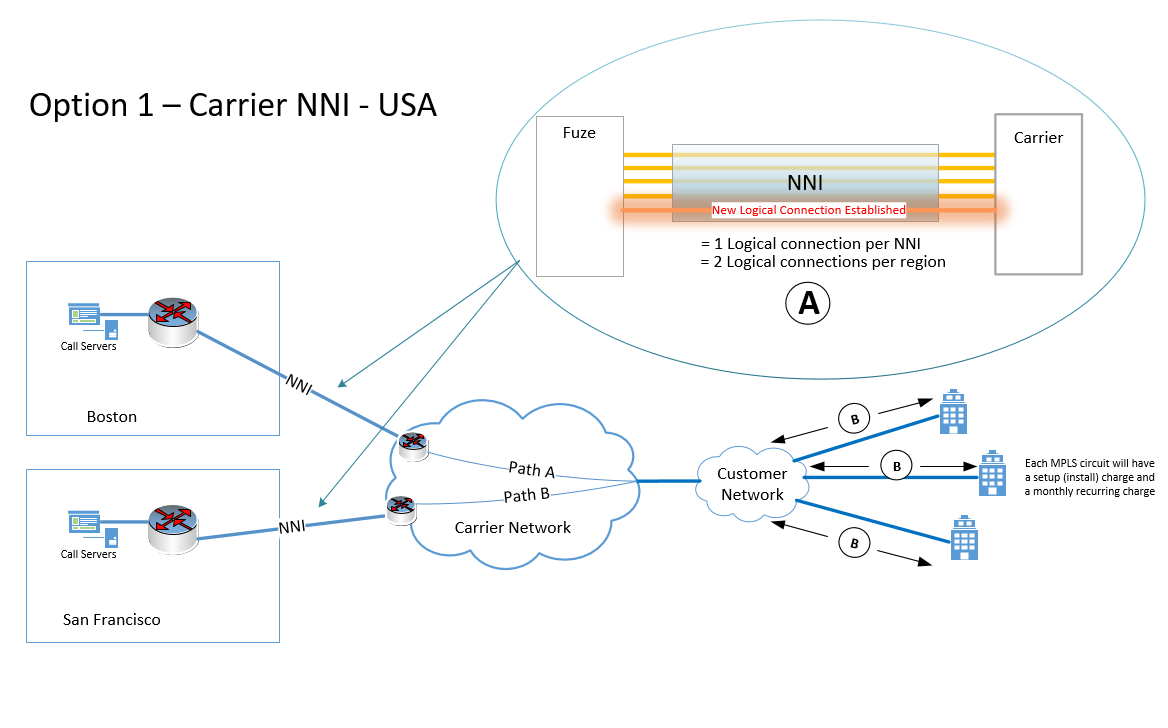Customer Connectivity Options for Interconnecting MPLS/Private Networks to Fuze
Introduction
This connectivity guide is to assist with the selection of the correct connectivity model for connecting customer networks to Fuze. This will also provide guidance on which SKUs must be booked when creating a customer CSA.
Fuze MPLS network inter-connectivity has three options, which are comprised of:
Carrier NNI
This is where the customer is connecting a network they have already with a carrier that Fuze has an existing relationship with and connectivity into our datacentres. The connection may just be between the networks where a logical connection can be established between Fuze and the network provider or, the customer may also be ordering circuits to their office locations through Fuze who will order the circuits with the carrier partner. In both instances there will be network costs associated with the install and if customer premise circuits are involved there will in addition be costs associated with the provision of these.
Carrier NNI is also relevant if Fuze are providing MPLS premise circuits which need to be connected to the Fuze network, ie they are not standalone circuits providing access to the internet, these are circuits that are installed solely for the purpose of connecting a customer site to the Fuze network and therefore the bandwidth allocated to the MPLS premise circuit also needs to be assigned (or reserved) in the NNI that connects the carrier to Fuze.
For charging purposes Carrier NNI is broken into two distinct parts, firstly the circuits provided at the customer premise must be charged for and secondly the capacity reserved on the NNI is also chargeable. The circuit cost is variable because every site (customer premise) is unique in its location and therefore this must be quoted by the Fuze Logistics Team on a site by site basis. The cost of the NNI reservation is broken into two parts, the first is a non-recurring fee which is to cover the Fuze costs for the configuration and commissioning of the customer link. The second cost is a monthly recurring fee which covers the cost of the service with the carrier and a contribution to the Fuze datacentre and support costs.
Bring Your Own Bandwidth ‘BYOB’ unmanaged
This is where a customer wishes to connect their network to Fuze but they are with a network provider that is not one of the carrier partners that Fuze has a relationship with (and hence no NNI connectivity). This option allows for a customer to connect their network to Fuze by means of a fibre cross connect between their network or equipment into one of the datacentres where Fuze has a virtual presence. By virtual presence this means a facility where the customer can connect to the network of a Fuze network connectivity partner who can then extend this connection into Fuze via a dedicated link. Currently Fuze has a contract with EpsilonTel to provide this network connectivity/aggregation service.
Bring Your Own Bandwidth ‘BYOB’ managed with hardware
This is where a customer wishes to connect their network to Fuze but is with a network provider that is not one of the carrier partners that Fuze has a relationship with (and hence no NNI connectivity). There are circumstances where a network operator will insist on providing a device to serve as a termination or demarcation point (could be a router or a switch) between their network and Fuze. In reality, what is happening is the customers network provider installs another MPLS circuit location, often referred to as a spoke (like in a wheel) but in this instance the delivery location for the circuit is not a customer office premises but a datacentre. This poses additional problems since as of end of 2017 Fuze has no facilities which can host third party hardware and hence hosting hardware is an expensive and least favourable option for network connectivity and should be a last resort as Fuze must facilitate this through a third party provider Epsilontel who can host hardware in a limited number of locations globally.
There are regional variations on how the interconnection process is established. The three regions are currently separated into USA, EMEA and APAC. Fuze has a relationship with EpsilonTel to provide the virtual point of presence to the Fuze network and a limited number of locations where hardware can be accommodated.
How to decide which option is best for your organization
The simple flowchart below should be used to decide which is the option needed to facilitate customer connectivity:
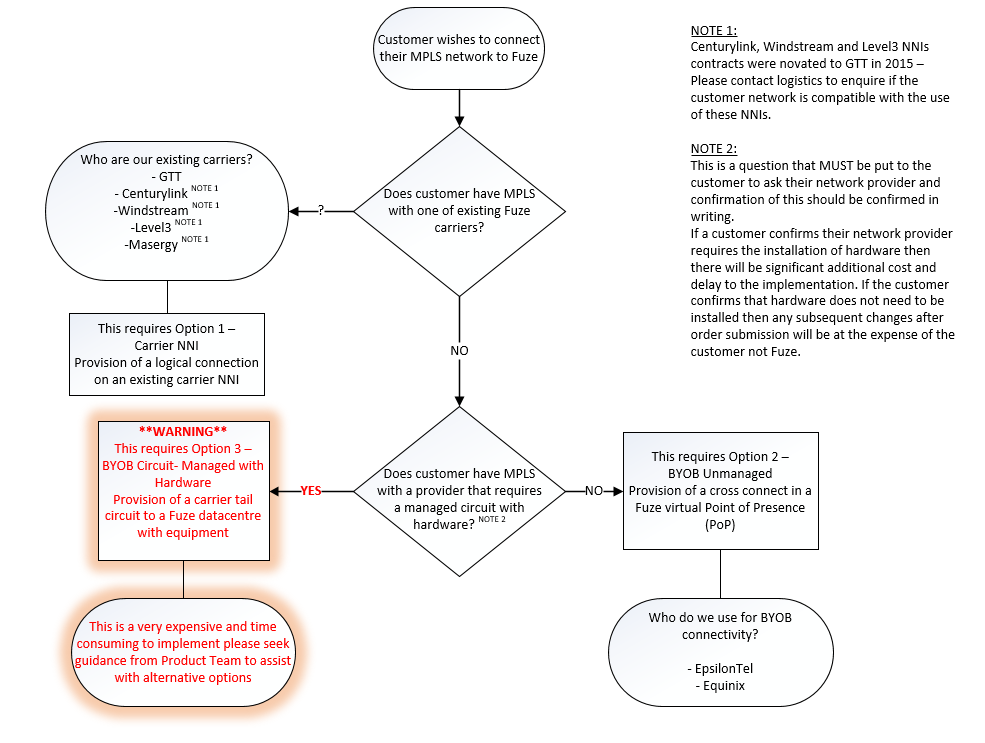
CARRIER NNI USA
Carrier NNI – USA Key Facts
- Fuze has NNIs with GTT in East and West Coast PoPs – BOS and SFO.
- An NNI can be partitioned into separate connections known as VLANs. Each VLAN within the NNI is unique and separate from the other VLANs.
- There are two scenarios possible with Carrier NNI:-
- Customer is already with GTT and wishes to extend (connect) their GTT provided network to Fuze.
- Fuze will arrange with GTT to extend the customer network across a logical connection on each NNI. This means there is geographical redundancy for the customer connection shown as Path A and Path B on the diagram on page 5. There will be SKUs to book for this which will cover the Fuze provisioning and network costs.
- Customer is ordering GTT MPLS premise circuits through Fuze for the purposes of offering dedicated circuits for Fuze voice service.
- Fuze will order the premise circuits with GTT and as part of this process GTT will extend this network across a new logical connection (VLAN) on each NNI.
This means there is geographical redundancy for the customer connection shown as Path A and Path B on the diagram on page 5. There will be SKUs to book for this which will cover the Fuze provisioning and network costs PLUS there will be SKUs associated with the premise circuit costs.
Carrier NNI – USA SKU and Pricing
GTT extending network only. (Note: This is where the customer already has MPLS circuits with GTT and extending this network to Fuze)
There will be network side SKUs chargeable for the installation cost and monthly service fee. In addition, because GTT are not gaining any circuit revenue they will levy a bandwidth cost so the monthly service fee will cover this charge. The monthly bandwidth costs are included in the SKU.
SKU: VCX-NW-MR-MPLSAX-BW-USA
SKU Description in portal: ‘Bandwidth charge for MPLS carrier NNI USA region’
Covers: The install and monthly network related charges for the TWO logical connections per region and committed bandwidth. One SKU is booked.
GTT Providing Circuits on behalf of Fuze
There will be circuit costs per site which will be quoted by Fuze Logistics Team. In addition, there will be network side costs for the provision and testing of these services along with a monthly service fee.
Circuit Costs
SKU: VCX-NW-MR-MPLS-ACC-CCT
SKU Description in portal: ‘MPLS Access circuit at customer premise’
Covers: The installation and monthly costs levied by GTT and charged by Fuze to the customer. Each circuit requires a separate SKU to be booked per site.
Network Side Costs
SKU: VCX-NW-MR-MPLSAX-EB-USA
SKU Description in portal: MPLS access charge for carrier NNI USA
Covers: The install and monthly network related charges for the TWO logical connections per region. One SKU needs to be booked whether the customer is ordering circuits at one or many sites. If adding a new site to an existing Fuze installation then only the install charge needs to be applied, the monthly cost can be waived.
BYOB USA – No Hardware
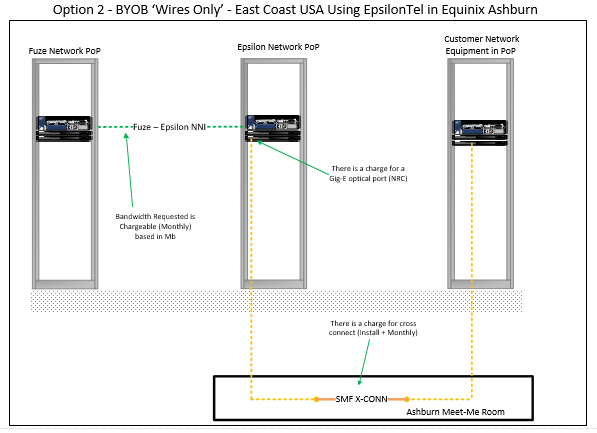
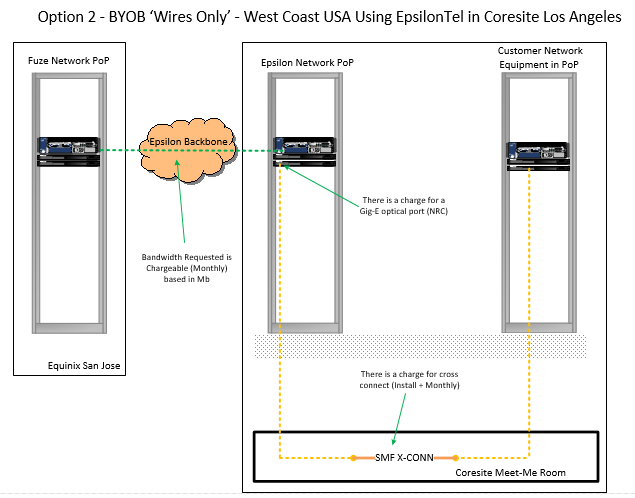
BYOB – USA Key Facts
- Fuze has invested in new infrastructure in the USA to meet the needs of next generation UC.
- Additional Datacentres in Ashburn VA (ASH) and San Jose CA (SJO) have added locations on the East and West Coast in Equinix datatentres. Equinix is now probably the biggest datacentre provider globally.
- Boston and San Francisco datacentres are still very much active but no longer accept third party connections due to the overhead in providing and maintaining the service directly. Therefore, future BYOB requirements will be met via Fuze partners like EpsilonTel, not Fuze directly.
- BYOB as opposed to Carrier NNI requires a cross connect per network being connected, once the connection is made from the customer network provider to EpsilonTel the network is extended across to Fuze via an NNI that is segregated into virtual circuits, one for each unique customer.
- EpsilonTel provide a layer-2 connectivity option therefore if the customer wishes to have connectivity on the East and West coast then there will need to be a cross connect in each of the ASH and SJO locations.
BYOB USA – SKUs and Pricing
There are three SKUs that need to be booked for BYOB;- a cross connect charge, a port charge and a bandwidth charge.
- Cross connect covers the cost of the fibre cross connection between the customer network termination point in the meet-me room
- Port charge covers the cost of the physical port that the cross connect plugs into on the EpsilonTel equipment
- Bandwidth charge covers the cost of the bandwidth consumed within the EpsilonTel network.
Ashburn
Cross connect SKU: VCX-NW-MR-SMF-EPS-XCONN-ASH
Cross connect SKU description in portal: ‘SMF Cross Connect - Equinix Ashburn, VA, USA’
Port SKU: VCX-NW-SU-EPS-CLX-1G
Port SKU description in portal: ‘Epsilon Cloud Link Exchange (CLX) or standard 1G optical port’
Bandwidth SKU: VCX-NW-MR-MPLS-EPS-BW
Bandwidth SKU description in portal: ‘Network bandwidth charge (MB reserved on interconnection)’
Coresite Los Angeles
Cross connect SKU: VCX-NW-MR-SMF-EPS-XCONN-COR
Cross connect SKU description in portal: ‘SMF Cross Connect - Coresite, VA, USA’
Port SKU: VCX-NW-SU-EPS-CLX-1G
Port SKU description in portal: ‘Epsilon Cloud Link Exchange (CLX) or standard 1G optical port’
Bandwidth SKU: VCX-NW-MR-MPLS-EPS-BW
Bandwidth SKU description in portal: ‘Network bandwidth charge (MB reserved on interconnection)’
BYOB USA – With Hardware
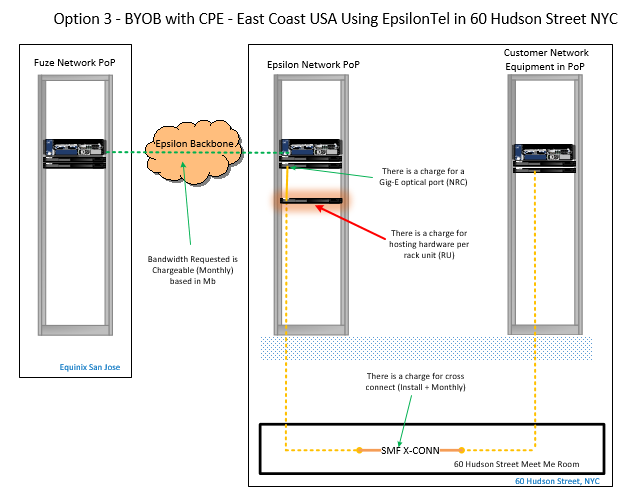
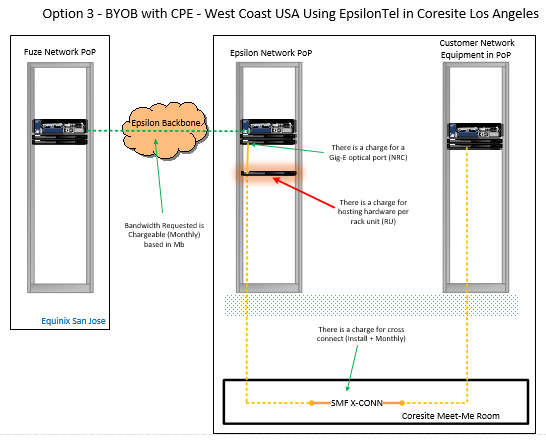
BYOB With Hardware – USA Key Facts
- This is the least favourable option for joining a network to Fuze
- BYOB with many network providers entails the provision of a device such as a router or a switch to act as a demarcation/handover point
- The reasons why many network operators insist on installing a hardware device for BYOB are many and varied but usually because they don’t have a specific datacentre product for BYOB so the only alternative is to order an additional MPLS tail into the datacentre, in effect and additional virtual connection for that customer network
- Hardware hosting is increasingly unpopular as it adds an additional piece of hardware that needs to be housed and maintained, in today’s world of cloud connectivity nobody wants devices taking up rack space and consuming power
- Fuze ceased to provide this service at the end of 2017
- This option is very expensive and lead times can be long, it has also been a source of operator and customer frustration since despite datacentres being locations of inter-network connectivity they are not best suited to the provision of circuits usually delivered to customer premise.
EpsilonTel can host hardware on behalf of Fuze in two locations in the USA, these are:
- 60 Hudson Street, NYC
- Coresite Los Angeles.
If a customer is prepared to pay the costs involved to extend their MPLS network to Fuze via the provision of circuit tails with their network provider then they will be required to do the following:
- Order a circuit to each location and the hardware delivery point will be the EpsilonTel rack in that facility.
- Be responsible for their network operator charges for the circuit delivery into the datacentre meet me room (MMR). For 60 Hudson Street in NYC this means the MMR on the 10th Floor where EpsilonTel is located
- Be charged for the costs for extending the circuit from the MMR to the rack location where the hardware will be housed. These charges will include the cross connects and extending the circuit from the hardware to the EpsilonTel port.
- Be charged for hosting the hardware and costs will be incurred for each rack unit used.
- Be charged for the bandwidth requested from their MPLS network into the EpsilonTel/Fuze network.
It is imperative for the customer to understand from the above that there are extensive costs involved with this method which add a significant overhead into any deal and these costs will not be borne by Fuze.
BYOB USA – SKUs and Pricing
60 Hudson Street, NYC:
There are four SKUs that are to be booked to facilitate an install.
Hardware hosting per rack unit
SKU: VCX-NW-MR-1U-RACK-EPS-NYC
SKU description in portal: ‘Data Centre Rackspace 1U - Epsilon 60 Hudson Street, New York’
Cross connect in MMR on 10th floor
Cross connect SKU: VCX-NW-MR-SMF-EPS-XCONN-NYC
Cross connect SKU description in portal: ‘SMF Cross Connect – 60 Hudson Street, NYC, USA’
Port Access
Port SKU: VCX-NW-SU-EPS-CLX-1G
Port SKU description in portal: ‘Epsilon Cloud Link Exchange (CLX) or standard 1G optical port’
Bandwidth
Bandwidth SKU: VCX-NW-MR-MPLS-EPS-BW
Bandwidth SKU description in portal: ‘Network bandwidth charge (MB reserved on interconnection)’
There are four SKUs that are to be booked to facilitate an install.
Hardware hosting per rack unit
SKU: VCX-NW-MR-1U-RACK-EPS-LA
SKU description in portal: ‘Data Centre Rackspace 1U - Coresite Los Angeles’
Cross connect in MMR
Cross connect SKU: VCX-NW-MR-SMF-EPS-XCONN-LA
Cross connect SKU description in portal: ‘SMF Cross Connect – Coresite Los Angeles, USA’
Port Access
Port SKU: VCX-NW-SU-EPS-CLX-1G
Port SKU description in portal: ‘Epsilon Cloud Link Exchange (CLX) or standard 1G optical port’
Bandwidth
Bandwidth SKU: VCX-NW-MR-MPLS-EPS-BW
Bandwidth SKU description in portal: ‘Network bandwidth charge (MB reserved on interconnection)’
CARRIER NNI EMEA/APAC
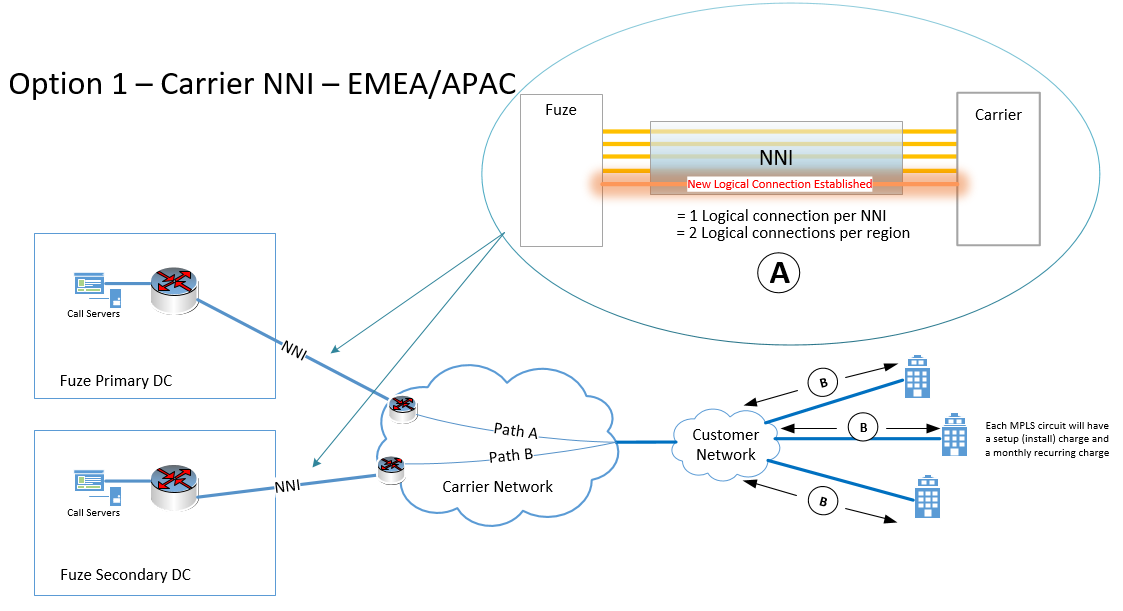
Carrier NNI – EMEA/APAC Key Facts
- Fuze has NNIs with GTT in London and Frankfurt for EMEA, Hong Kong and Sinapore for Asia and Sydney for Australia.
- An NNI can be partitioned into separate connections known as VLANs. Each VLAN within the NNI is unique and separate from the other VLANs.
- There are two scenarios possible with Carrier NNI:
Customer is already with GTT and wishes to extend (connect) their GTT provided network to Fuze.
- Fuze will arrange with GTT to extend the customer network across a logical connection on each NNI. This means there is geographical redundancy for the customer connection shown as Path A and Path B on the diagram on page 5. There will be SKUs to book for this which will cover the Fuze provisioning and network costs.
Customer is ordering GTT MPLS premise circuits through Fuze for the purposes of offering dedicated circuits for Fuze voice service.
- Fuze will order the premise circuits with GTT and as part of this process GTT will extend this network across a new logical connection (VLAN) on each NNI. This means there is geographical redundancy for the customer connection shown as Path A and Path B on the diagram on page 17. There will be SKUs to book for this which will cover the Fuze provisioning and network costs PLUS there will be SKUs associated with the premise circuit costs.
Carrier NNI – EMEA/APAC SKUs and Pricing
GTT extending network only. (Note: This is where the customer already has MPLS circuits with GTT and extending this network to Fuze)
There will be network side SKUs chargeable for the installation cost and monthly service fee. In addition, because GTT are not gaining any circuit revenue they will levy a bandwidth cost so the monthly service fee will cover this charge. The monthly bandwidth costs are included in the SKU.
EMEA
SKU: VCX-NW-MR-MPLSAX-BW-EMEA
SKU Description in portal: ‘Bandwidth charge for MPLS EU region’
APAC
SKU: VCX-NW-MR-MPLSAX-BW-APAC
SKU Description in portal: ‘Bandwidth charge for MPLS APAC region’
Covers: The install and monthly network related charges for the TWO logical connections per region and committed bandwidth. One SKU is booked.
GTT Providing Circuits on behalf of Fuze
There will be circuit costs per site which will be quoted by Fuze Logistics Team. In addition, there will be network side costs for the provision and testing of these services along with a monthly service fee.
Circuit Costs
SKU: VCX-NW-MR-MPLS-ACC-CCT
SKU Description in portal: ‘MPLS Access circuit at customer premise’
Covers: The installation and monthly costs levied by GTT and charged by Fuze to the customer. Each circuit requires a separate SKU to be booked per site.
Network Side Costs
EMEA:
SKU: VCX-NW-MR-MPLSAX-EB-EMEA
SKU Description in portal: ‘MPLS access charge for carrier NNI EMEA’
APAC:
SKU: VCX-NW-MR-MPLSAX-EB-APAC
SKU Description in portal: ‘MPLS access charge for carrier NNI APAC’
Covers: The install and monthly network related charges for the TWO logical connections per region. One SKU needs to be booked whether the customer is ordering circuits at one or many sites. If adding a new site to an existing Fuze installation then only the install charge needs to be applied, the monthly cost can be waived.
BYOB EMEA/APAC – No Hardware
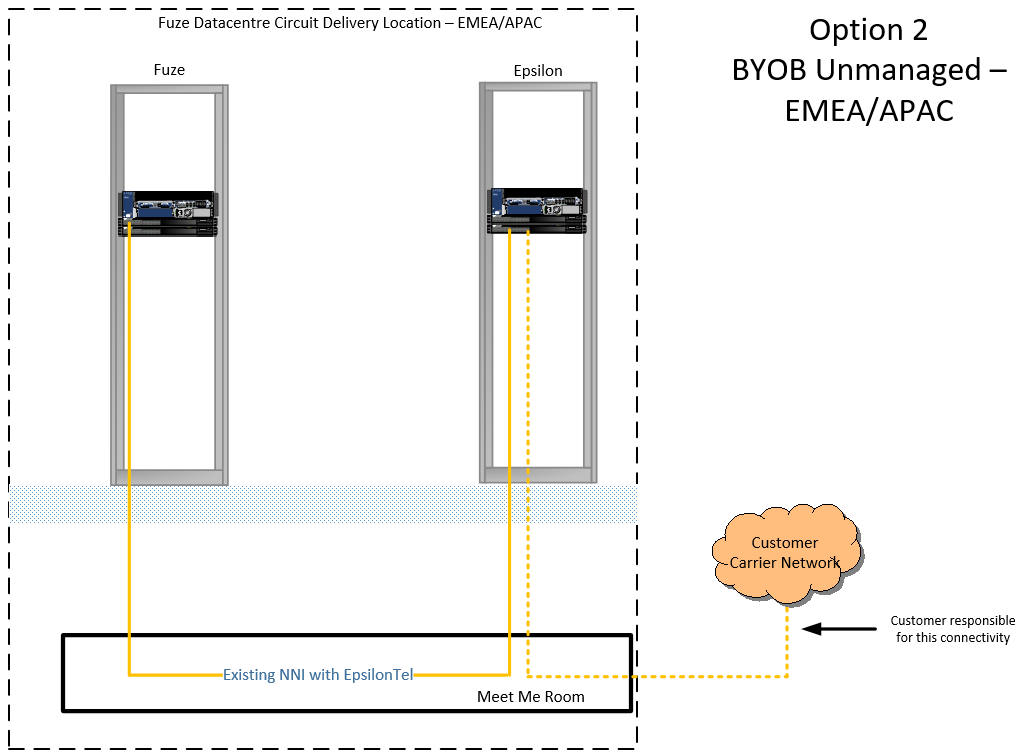
BYOB – EMEA/APAC Key Facts
- BYOB as opposed to Carrier NNI requires a cross connect per network and location being connected, once the connection is made from the customer network provider to EpsilonTel the network is extended across to Fuze via an NNI that is segregated into virtual circuits, one for each unique customer.
- The PRIMARY locations for BYOB interconnection are:
- EMEA:
- London
- Frankfurt
- APAC:
- Hong Kong
- Singapore
- Sydney
- PRIMARY locations are where Fuze has equipment located in the same datacentre.
- EpsilonTel has PoPs in many datacentres that allows connectivity to other networks which can then be connected to Fuze across the EpsilonTel backbone network. This gives much greater flexibility in how a network can connect to Fuze remotely.
BYOB EMEA/APAC – SKUs and Pricing
There are three SKUs that need to be booked for BYOB: a cross connect charge, a port charge and a bandwidth charge.
- Cross connect covers the cost of the fibre cross connection between the customer network termination point in the meet-me room
- Port charge covers the cost of the physical port that the cross connect plugs into on the EpsilonTel equipment
- Bandwidth charge covers the cost of the bandwidth consumed within the EpsilonTel network.
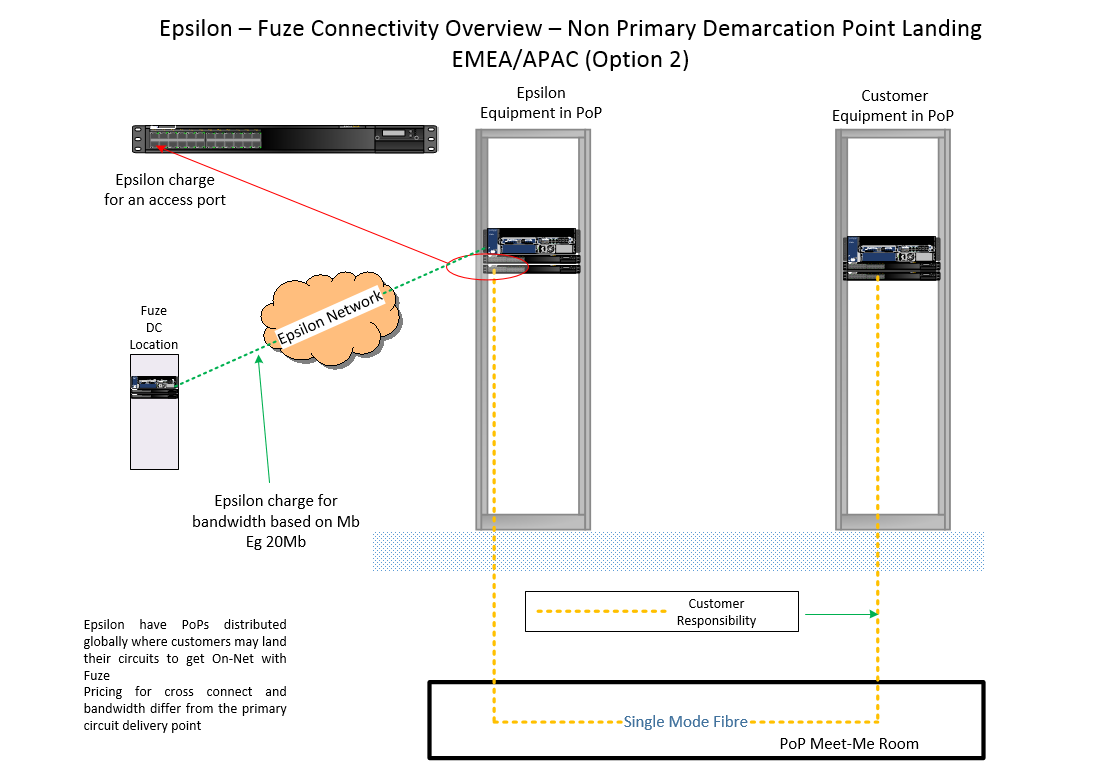
Epsilon Port and Cross Connect Locations and SKUs in EMEA and APAC
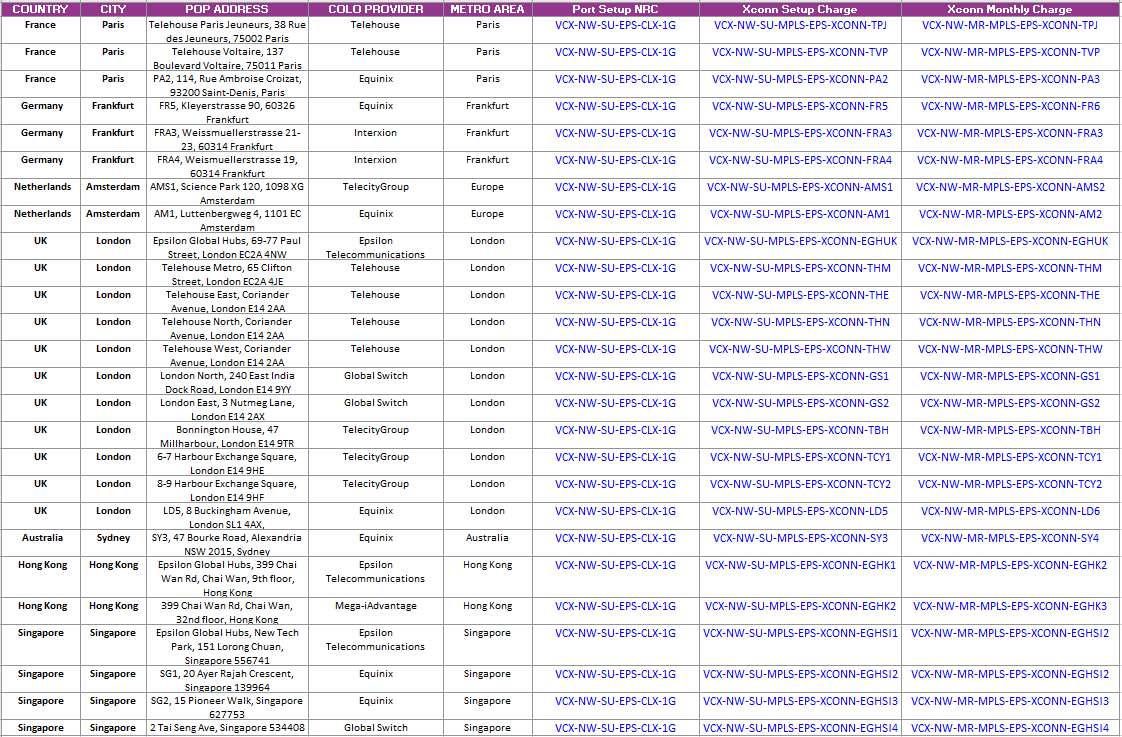
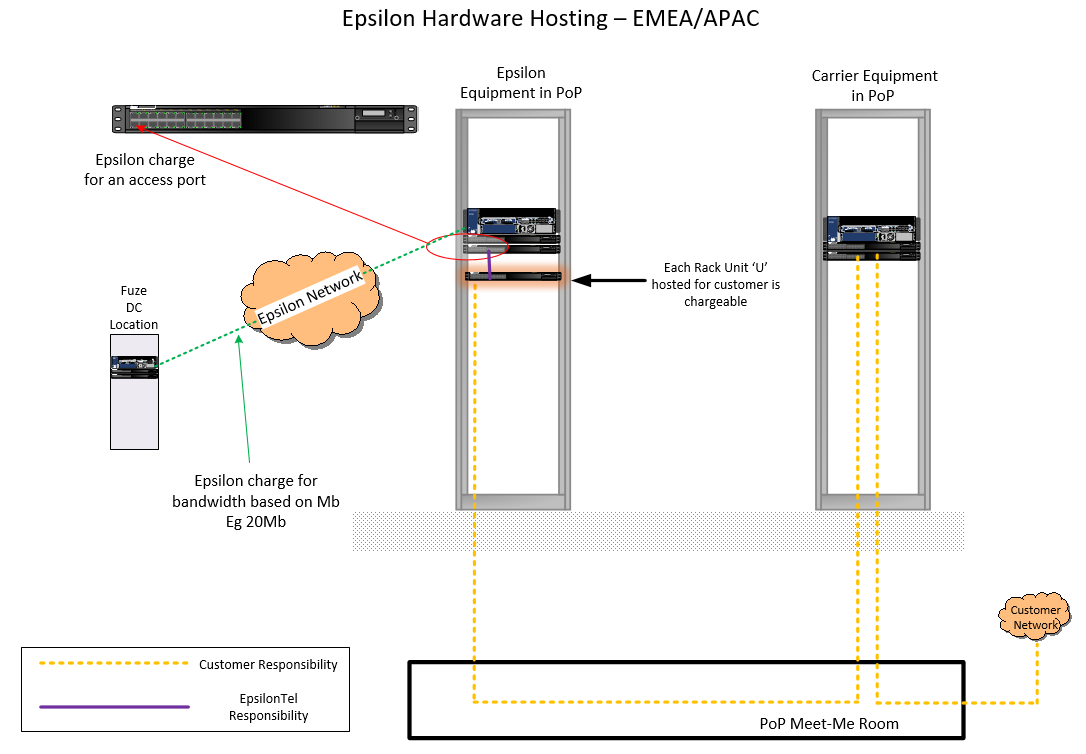
BYOB with Hardware– EMEA/APAC Key Facts
- BYOB with hardware is restricted to certain EpsilonTel PoPs where they are able to host hardware devices.
- Not every EpsilonTel can host hardware.
- Hosting is on a per rack unit (RU) basis, each RU is chargeable, therefore if a customer desires to use 2RU then they will pay twice the basic SKU price.
- Cross connect and other charges associated with BYOB are still required.
BYOB EMEA/APAC – SKUs and Pricing
There are four SKUs that need to be booked for BYOB with hardware;- a cross connect charge, a port charge, a bandwidth charge and the rack unit hosting charge.
- Cross connect covers the cost of the fibre cross connection between the customer network termination point in the meet-me room, in this instance this is usually where the carrier delivers the physical circuit from their network to or it could be to extend the circuit from the carrier demarcation point to the EpsilonTel rack where the hardware is hosted.
- Port charge covers the cost of the physical port that the cross connect plugs into on the EpsilonTel equipment
- Bandwidth charge covers the cost of the bandwidth consumed within the EpsilonTel network.
- Rack Unit charge covers the cost of hosting the hardware device and is PER RACK UNIT.
Epsilon Hardware (CPE) Locations and SKUs in EMEA and APAC

Please note that hardware hosting by Epsilon will need to be verified BEFORE an order is accepted from the customer. The reason for this is to verify that rack space is available and can be reserved for an impending order.
Where hardware is hosted charges are per rack unit (RU) and there still needs to be a cross connect, port and bandwidth SKU assigned.
Epsilon Bandwidth SKUs in EMEA and APAC
Epsilon are implementing their Cloud Link Exchange product (CLX). The Fuze NNIs in EMEA and APAC are connected to CLX which will allow Fuze to dynamically assign bandwidth to a customer connection when the circuit is ready for test and turn-up. This bandwidth can be increased should the need arise due to increase in traffic from the customers’ endpoints. Granular bandwidth pricing can be obtained from Logistics.
The benefit of being able to turn-up the bandwidth in this dynamic way is Epsilon will not charge Fuze a bandwidth cost until this is enabled so when the circuit turn-up is ready the bandwidth can be switched on, this means Fuze is not charged for bandwidth if there is a delay between Ready for Service and testing.
The SKU for the bandwidth charge is:
SKU: VCX-NW-MR-MPLS-EPS-BW
SKU description in portal: ‘Network bandwidth charge (MB reserved on interconnection)’
Basic Rules of Connectivity
- A customer who is buying or already has a circuit with a Fuze carrier partner can have logical MPLS nodes on the existing NNI – This is the network side deployment
- This is a standard technical deployment which involves the provision of two logical MPLS nodes
- Each customer is provisioned as a segmented VRF/VLAN (this keeps separation from other customers on the NNI)
- eBGP4 Peering with QoS
- The customer is responsible for the circuit and/or access charges and NO hardware permitted
- Where a customer is ordering new circuits and interconnection then there are Premise based charges in addition to the Network side costs (the premise based charges are the costs of the circuit tails to customer sites and can vary dependant on the location and last mile provider)
BYOB
- A customer who has MPLS with a carrier that is not on-net with Fuze can connect their network to one or both Fuze datacentre locations in a region
- This is a standard technical deployment which involves the provision of a physical MPLS node in each datacentre location
- Each customer is provisioned as a separate VRF/VLAN (this keeps separation from other customers). Cross connect must be single mode fibre and unless agreed otherwise with SC connectors and Fuze expects non-encapsulated (802.1q) Ethernet hand-off
- eBGP4 Peering. QoS is dependent on the customers carrier
- The customer is responsible for the circuit access charges and NO hardware is permitted – This is ‘wires only’
- Maximum of two BGP peering sessions allowed.
BYOB with Hardware. Same rules as for BYOB but in addition:
- The physical hosting if for carrier circuit termination only to facilitate an additional MPLS node on the customer network.
- No additional equipment allowed such as terminal servers, POTS lines etc
- Equipment should be pre-provsioned by the carrier and all interfaces labelled correctly. The install cost covers the mounting of the equipment and providing power and connectivity, the equipment should be plug and play.
FAQs
Q: The customer says they have an MPLS network, how do I know which option they need?
A: Check which network provider they are with. If it is GTT then it should be Carrier NNI. Any other provider then it will be BYOB.
Q: I have heard we have NNIs with other carriers apart from GTT, surely they also support Carrier NNI?
A: That is true, Centurylink, Sprint, Masergy and Windstream have NNIs to Fuze but all these contracts were novated to GTT in 2015 so not owned by Fuze anymore – Best submit a request to Logistics for clarification.
Q: The customer is not with one of our carrier partners, how do I know which BYOB method is needed?
A: The customer must ask their network provider if they allow cross connection in a datacentre with fibre only and clearly ask if any hardware is needed.
Q: The customer says their network provider is not on-net in any of the PoPs that Fuze or EpsilonTel are located, how can we join the networks?
A: This is possible by asking their network provider to extend a circuit from their nearest PoP location to a Fuze/EpsilonTel PoP. This is an expensive option though.
Q: Why can’t the customer connect their network directly into a Fuze PoP and equipment?
A: Fuze PoPs are solely for hosting Fuze equipment, we provide multiple methods of connection that do not need direct connection into Fuze equipment.
Q: Can the customer access all Fuze services via their MPLS extension to Fuze?
A: No, only voice can use this connectivity, everything else must go over the top.
Q: Is there a better way than Carrier NNI or BYOB?
A: Extending a customer MPLS network to Fuze is a very robust way to carry voice services however Fuze has excellent connectivity to the internet via Tier1 providers and is now connected to major Internet Exchanges globally which allows direct connectivity to multiple networks. The customer should be encouraged to explore these options.
Q: Why is this so expensive?
A: There is a lot of work involved behind the scenes to connect a customer MPLS network to Fuze which previously has not been accounted for. Fuze now needs to ensure these product are not given away for free or heavily discounted.

